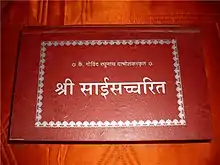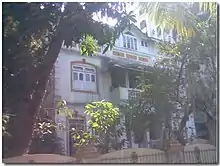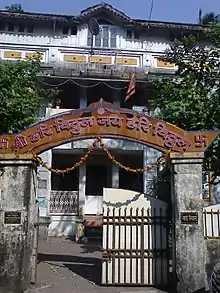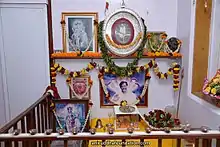Sai Satcharitra
The Sai Satcharita (Marathi: श्री साई सत्चरित्र, also called Sri Sai Satcharitra) is a biography based on the true life stories of Sai Baba of Shirdi. Authored by Shri. Govind Raghunath Dabholkar alias Hemadpant, the original edition of the Sai Satcharitra was published in Marathi on 26 November, 1930. A subsequent english edition was soon published in 1944, by Shri. Nagash Devastate (N.V.) Gunaji, translated from the original Marathi composition.
| Sai Satcharitra | |
|---|---|
 Sri Sai Satcharitra | |
| Information | |
| Author | Hemadpant |
| Language | Marathi |
| Chapters | 52 |
| Verses | 9450 |
The work has since been translated to English, Hindi, Gujarati, Kannada, Tamil, Telugu, Sindhi, Bengali, Odiya, Nepali, Punjabi and Konkani languages. Another English version was also published in New York.
History
In 1910, when Hemadpant (also known as Late. Govindrao (Annasaheb) Raghunath Dabholkar)[1] came to Shirdi, he observed a miracle by Sai Baba in which baba had prevented the raging cholera epidemic from entering Shirdi by grinding wheat on a grindstone and dispersing them around the borders of the Shirdi village.
Witnessing this event is believed to have inspired Hemadpant to document the leela's of Sai Baba of Shirdi. Hemadpant soon sought the help of "Madhavrao Deshpande" alias Shama who advocated his cause before Sri Sai Baba himself. In 1916, Sai Baba gave his consent, stating,
"You have my full consent to write my life history. Take notes and keep them. If my leelas are recorded, sins committed through ignorance will be dissolved. When my leelas are heard and/or read with love and devotion, the cares and troubles of worldly life will be forgotten."
This event, mentioned in the second chapter of Sri Sai Satcharita, marked the beginning of the Sai Satcharita. Hemadpant wrote the Sai Satcharita at his residence called Sai Niwas in Bandra, Mumbai. Sai Niwas is more than 100 years old today and still carry forwards the tradition of Sai Bhakti (Sai Devotion) for numerous Sai devotees across the world. Shri Sai Satcharitra also mentions about Sai Niwas (Chapter 40 : Attending Mrs.Deo's Udyapan Ceremony as a Sannyasi with two Others (Trio) and Hemadpant's House in the Form of His Picture) where this divine holy book was written. [2] [3] [4] [5] The Sai Satcharita consists of 9450 verses spread over 52 Chapters.[6]
Hemadpant is believed to have begun writing the Sri Sai Satcharita in 1922. He died after finishing the 51st Chapter in 1929. The desk on which Hemadpant wrote the manuscript of the Sai Satcharita is well preserved and is placed in the same room in Sai Niwas on which he sat and wrote the Sai Satcharita. Besides the desk, other memorable, such as Hemadpant’s turban, etc. have also been well preserved.



Sai Satcharitra Panchasheel Exam
Every time one reads Sai Satcharitra, it provides a new perspective and ever evolving answers to the questions of the devotees and hence Sai Satcharitra is a treasure imparting joy and contentment to the readers. Shree Sai Samartha Vidnyan Prabodhini in association with Shree Aniruddha Upasana Foundation, Mumbai, India conducts special Panchasheel (Five Levels) Examination on Sai Satcharitra twice every year which aims to unwind the treasure in the form of Sai Satcharitra to all the devotees. The examination is a tool to test the knowledge due to which one studies and learns a subject with concentration. Sai Satcharitra Panchasheel Exams help devotees to read, learn and understand Sai Baba’s stories more clearly which ultimately improves their bhakti (devotion).
As the name suggests, this examination is conducted at five levels viz; Prathama (First Level) on chapters 1 to 10 of Sai Satcharitra, Dwitiya (Second Level) on chapters 11 to 20, Tritiya (Third Level) on chapters 21 to 30, Chaturthi (Fourth Level) on chapters 31 to 40 and lastly, Panchami (Fifth Level) covering practical exam and two theory papers; one on chapters 41 to 53 and second one on all chapters of Sai Satcharitra. Question Papers are available online and can be answered in any language and posted to the examination cell of Shree Sai Samartha Vidnyan Prabodhini in Mumbai, India